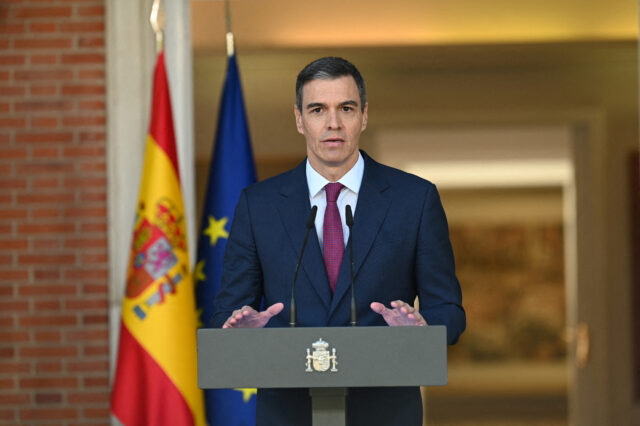
Spain’s Prime Minister Pedro Sanchez has decided to stay in office after days of publicly weighing his future. In a televised address, Sanchez made this announcement, ending a five-day drama. Last week, he said he was retreating from public duty to decide whether to quit.
“I have decided to go on, if possible even stronger as prime minister. This is not business as usual, things are going to be different,” he said.
He decidido seguir, con más fuerza si cabe, al frente de la Presidencia del Gobierno de España.
Asumo mi compromiso de trabajar sin descanso, con firmeza y serenidad, por la regeneración de nuestra democracia y por el avance en derechos y libertades.
Esta decisión no supone un… pic.twitter.com/RIhA7xS7QY
— Pedro Sánchez (@sanchezcastejon) April 29, 2024
Pedro Sanchez, 52, announced last Wednesday that he may quit in response to a corruption investigation against his wife. He says his political opponents have orchestrated the allegations against his wife.
He began Monday morning by meeting King Felipe VI, a step that would have been necessary if he had decided to resign. In his subsequent address, he said he told the monarch of his decision to stay, encouraged by widespread support for him over the weekend.
The furore over the future of Pedro Sanchez had caused turmoil in Spanish politics. A fractious parliament in Spain has struggled to form coalition governments after close elections. Had Sanchez’s resignation forced a new election, it would have been the fourth in five years.
Mixed Reactions
The decision to stay generated intense relief among the followers of Pedro Sanchez but the episode drew fierce mockery from opponents.
“Thank you for your bravery, your determination and also thank you for your humanity, prime minister,” Deputy Prime Minister Maria Jesus Montero wrote on X.
Madrid’s regional president Isabel Ayuso, an influential figure in the centre-right opposition People’s Party, dismissed Sanchez’s speech as a “joke”. “From now on we will be much stronger as a counterweight to this government that does not know its limits,” Ayuso said.
Gabriel Rufian, a lawmaker for the Catalan separatist party Esquerra Republicana said the melodrama could come across as “an act of frivolity”.
It would have been “a bad example if he left because it was not a resignation, it was a surrender. And an even worse example if he stays without doing anything,” Rufian wrote on X.
Pedro Sanchez’s vacillation may hurt him but the impact may be limited as Spain’s political landscape is already polarised, said Ignacio Jurado, political science professor at Madrid’s Carlos III University.
“His credibility is hotly contested and voters have already given it to him or taken it away,” he said. “As a leader he has shown a weakness and it’s something that the opposition will exploit a lot.”
The first measure of how the incident has affected Sanchez’s standing will come with regional elections in Catalonia on May 12. His Socialist party is projected to win most seats as it tries to wrest control from separatist parties.
My wife (Begona Gomez) and I are prepared for further attacks, said Sanchez. “We have endured this for 10 years. We can deal with it.”
With inputs from Reuters
At six feet and over, cool, calm and always collected. Never a hair out of place. He is the high priest of editorial facts, grammar is his baby and headlines are meat on the bone. Loves samosas and cricket, tracks Twitter and when in his cups, nothing better than Jagjit Singh’s ghazals.




